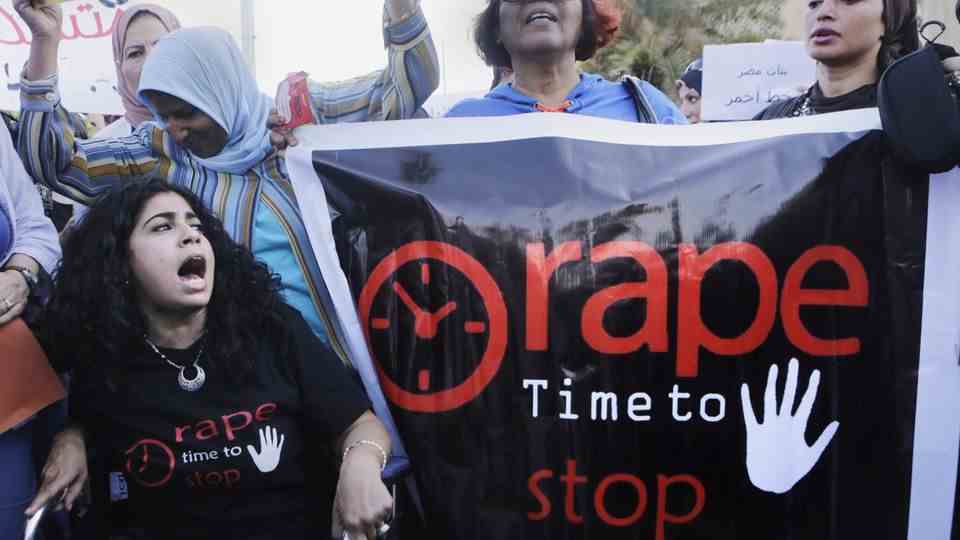opinion
right to abortion
Paragraph 219a is history. But we’re still stuck with one foot in the Middle Ages
Two young women protest for the right to abortion – and demand “Away with §218 and 219a”
© Sean Gallup / Getty Images
Paragraph 219a has fallen. Doctors are allowed to do their job again and inform women about abortions. That was long overdue – and yet it is only a stage win. The real fight is not over yet.
“It’s high time,” said Federal Minister of Justice Marco Buschmann (FDP) on Friday in the Bundestag. An hour later, paragraph 219a was buried. A comparatively quick end for the so-called “advertising ban for abortions”, which had been preceded by a decades-long struggle.
How unrealistic the “advertising ban” was in practice is probably no better than that of Kristina Hänel. Just because the word “abortion” was on her website, the general practitioner was sued and had to answer in several lawsuits for the fact that she was doing her medical duty. “When I spread the word 110 in the emergency services, I’m not advertising a heart attack or cardiac arrest,” says Hänel ZDF interview the absurdity in a nutshell.
That’s over now, and that’s a good thing. But the real problem – paragraph 218 – remains.
Abortions are still criminalized in Germany
Abortions are still prohibited in Germany under the Criminal Code. Only if they take place within the first 12 weeks after counseling and a three-day waiting period are they considered exempt from punishment. Now, of course, one could say that if you want to be aborted, you just have to follow the rules. But unfortunately that is too short-sighted. Because the reality of life for many pregnant women often looks very different.
On the occasion of the 50-year “We have aborted” title, the star dozens of women were again asked about their abortions last year. The frightening thing is that half a century later, the supply situation, the social stigma and the psychological pressure have hardly changed. We feel like we are still in the Middle Ages. Many women have said that they sometimes had to call around for days before they got an appointment for the mandatory consultation. A lot of people lose valuable time in the process, because most people don’t find out that they’re pregnant until the end of the fourth week at the earliest, and some don’t find out until much later.
In addition, especially in rural areas, fewer and fewer doctors offer abortions at all – also because these are far from being an integral part of medical training. The traffic light coalition now wants to change that, after all. But now only about every tenth gynecologist performs abortions. Many pregnant women therefore have to travel long distances to find an appropriate clinic for the procedure. Add to that the costs of around 300 to 500 euros for an outpatient procedure – a lot of money, especially for people from difficult backgrounds.
Not to mention the psychological pressure. None of the women who spoke to us took the decision lightly. But the fact that they might suddenly be seen as a criminal for a decision they made about their own body was more than humiliating for most.
A look abroad shows: liberal legislation – fewer dropouts
With 100,000 abortions per year, the number in Germany is rather low in an international comparison. A look abroad shows that if criminal liability were abolished, this would by no means lead to an abortion boom – as many opponents fear. But on the contrary. For decades, studies have shown that liberal legislation and comprehensive access to medical care actually lead to fewer abortions. Neither in Canada nor in our neighboring countries Austria and France have the numbers shot up after legalization.
Also the World Health Organization WHO argues from a scientific perspective: bans do not prevent abortions – they only increase the health risk for women. For example, an American tourist in Malta is now fearing for her life because the abortion despite her non-viable fetus forbidden is. The WHO is therefore calling on countries such as Germany, Malta and many others to remove these hurdles.
Talking is not enough, it is time to act
The traffic light coalition agreement states: “We are strengthening women’s right to self-determination.” Unfortunately, there is no talk of decriminalizing abortion once and for all. That became more than clear in the current Bundestag session, when Justice Minister Buschmann assured the worried Union that the two paragraphs – 218 and 219a – had to be “kept strictly separate”.
The “protection of life” laid down in 218 still applies more to an unborn cell cluster than to an unwanted mother. Real self-determination would be exactly that: to decide for yourself whether to have a child – or not.
Green Family Minister Lisa Paus was eager to emphasize that the coalition would set up a commission on the future of Paragraph 218, but with a “Yes, we also have to talk about 218” it was enough for her. No trace of real will to act.
But talking alone can no longer be enough for us in 2022. Or in the words of the Minister of Justice: “It’s high time”. High time to act.



